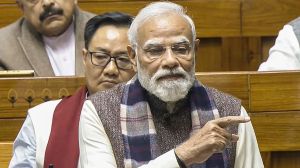Click here to follow Screen Digital on YouTube and stay updated with the latest from the world of cinema.
Gulzar’s Mausam is more palatable than Yash Chopra’s Lamhe, walks the uncomfortable line between parental and romantic love
Mausam has a sex worker in love with an older man, but she doesn't realise that he was once in love with her mother.
 Sanjeev Kumar and Sharmila Tagore in Gulzar's Mausam.
Sanjeev Kumar and Sharmila Tagore in Gulzar's Mausam. When Yash Chopra made Lamhe in 1991, the film was labelled ahead of its times. It also made a section of the audience extremely uncomfortable as the protagonist Viren ends up with Pooja, the daughter of the woman he was in love with during his youth. It was uncomfortable for the audience to see Viren ultimately accepting Pooja as the woman he now loves despite holding on to the memory of her late mother Pallavi for almost two decades. But Gulzar’s 1975 film Mausam, which was based on the same premise, ended a lot differently. Here, the male protagonist Amarnath, played by Sanjeev Kumar, sees the daughter of his beloved as his own daughter and finds it uncomfortable when she starts developing feelings for him.
Mausam is a delicate relationship drama which starts off as a love story between a doctor and a village belle named Chanda, played by Sharmila Tagore. As the two promise themselves to each other, Amarnath has to go back to the city to appear for his exams and he never returns. Decades later, when he comes to the village as an old man and a reputed doctor, he tries to pick up the pieces but by then, it’s too late. He finds Chanda’s daughter who looks exactly like her, but is shocked when he realises that she is a sex worker. Amarnath wants to make up for the lost time with his girlfriend but since she passed away years ago in a tragic state, his paternal instinct for the daughter-like Kajli kicks in.
Gulzar is a skilled storyteller when it comes to relationship dramas and it’s the same care that is evident in Mausam. The flashback part, where we see the love bloom between Amarnath and Chanda seems like a fantasy that’s too good to be true, and it perhaps is, because things take a sharp turn as soon as he steps out of that bubble. The relationship between Amarnath and Kajli, however, is the one that shows Gulzar’s handling of relationships, parental as well as romantic, with a wider age gap. He sees Kajli as his daughter so when he sees her making a living as a sex worker, he wants to be her saviour but is well aware that he doesn’t have any authority over her. He tries to buy her off from the brothel owner and is disappointed when she refuses, but doesn’t lose hope. Kajli, however, is unaware of his paternal emotions and interprets his love as romantic. She starts imagining a life with him where she can be secure, can be a mother, and get a fresh start.
 Sharmila Tagore plays a double role in Mausam. (Photo: Express Archives)
Sharmila Tagore plays a double role in Mausam. (Photo: Express Archives)
In a significant scene, when Kajli makes a move on Amarnath, he is disgusted by her. He pushes her away and judges her for bringing sex into the conversation but does not realise that for most of her life, men have only used her for sex, and paid for it. For her, giving herself away willingly is a big step and she is trying to act on what she interpreted as love. For Amarnath, thinking sexually about this daughter-like figure is a sin, and he feels even more guilty because he believes himself to be responsible for her state.
Sanjeev Kumar plays a lost old lover here, and his portrayal is a reminder of his work in Gulzar’s Aandhi. Both these men were once deeply in love, but are now trying to get back what they lost years ago. In Aandhi, he was the man who wasn’t courageous enough to support his ambitious wife, and here, he lacked the courage to come back to the village because he was ashamed of himself. Sharmila Tagore, who plays both the mother Chanda and daughter Kajli, was applauded for her work in the film and also won the National Award for Best Actress. Playing a village belle, and the starkly opposite sex worker in the same film was quite unheard of in the 1970s, even though it was the era of double roles. It was in the same decade that Hema Malini did Seeta Aur Geeta, Rakhee did Sharmeelee.
 Gulzar and Sanjeev Kumar on the sets of Mausam. (Photo: Express Archives)
Gulzar and Sanjeev Kumar on the sets of Mausam. (Photo: Express Archives)
Mausam tries to explore how a misstep in a relationship can end up destroying the lives of many people, even those who are not directly associated with it, and can even have an effect on future generations. In a lot of Gulzar’s films, the after-effects of a relationship falling apart are shown to be quite drastic, almost as if the protagonist is acting on impulse but the director’s handling of these situations makes you believe in them. In Achanak, Aandhi or Mere Apne, Gulzar speaks about the deep impact of a broken heart, and wounds that never heal — threads he unravel in his poetry as well.
- 01
- 02
- 03
- 04
- 05



































